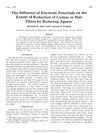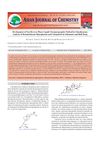 4 citations,
April 1955 in “Textile Research Journal”
4 citations,
April 1955 in “Textile Research Journal” The effectiveness of reducing agents on hair fibers depends on their electrode potentials.
 March 2024 in “Cell communication and signaling”
March 2024 in “Cell communication and signaling” Lack of sleep in mice leads to prostatitis by reducing certain hormones and activating an inflammatory pathway, which can be temporarily fixed with normal sleep.
 77 citations,
July 2020 in “Journal of the European Academy of Dermatology and Venereology”
77 citations,
July 2020 in “Journal of the European Academy of Dermatology and Venereology” Environmental factors, hormones, nutrition, and stress all significantly affect skin health and aging.
[object Object]  6 citations,
July 2015 in “European Journal of Dermatology”
6 citations,
July 2015 in “European Journal of Dermatology” Stopping methotrexate might reverse lymphoma-like conditions in some patients.
 30 citations,
January 2023 in “EFSA journal”
30 citations,
January 2023 in “EFSA journal” Adults should not consume more than 255 micrograms of selenium per day to avoid risk of hair loss and other side effects.
 January 2017 in “Springer eBooks”
January 2017 in “Springer eBooks” Eating a balanced diet with specific nutrients can help manage menopause symptoms and prevent related health issues.
 September 2016 in “Hair transplant forum international”
September 2016 in “Hair transplant forum international” Methylene blue is less effective than normal saline solution for storing hair grafts and may reduce graft survival.
 19 citations,
March 2011 in “Cutaneous and Ocular Toxicology”
19 citations,
March 2011 in “Cutaneous and Ocular Toxicology” Some chemicals absorbed through the skin can cause serious health problems.
 16 citations,
October 2015 in “Photochemistry and photobiology”
16 citations,
October 2015 in “Photochemistry and photobiology” Reducing copper (II) ion levels in hair can decrease hair damage.
 68 citations,
September 2018 in “International Journal of Molecular Sciences”
68 citations,
September 2018 in “International Journal of Molecular Sciences” Air pollution (PM10) increases skin inflammation and aging by reducing collagen and may trigger a repair response in skin cells.
[object Object]  1 citations,
October 2023 in “Life science alliance”
1 citations,
October 2023 in “Life science alliance” Pantethine may boost the immune system's ability to fight sarcoma.
 45 citations,
September 1998 in “Journal of Investigative Dermatology”
45 citations,
September 1998 in “Journal of Investigative Dermatology” The enzyme 17β-HSD type 2 mainly performs oxidation in human sebaceous glands, which may help protect against acne.
 April 2024 in “Research Square (Research Square)”
April 2024 in “Research Square (Research Square)” Selenium supplements can help improve symptoms and metabolic markers in lupus patients.
 123 citations,
December 2015 in “Journal of Neuroendocrinology”
123 citations,
December 2015 in “Journal of Neuroendocrinology” New targets for making and using brain-synthesized steroids could lead to better treatments for brain disorders and alcoholism.
 3 citations,
January 2021 in “Wear”
3 citations,
January 2021 in “Wear” Hair's resistance to wear varies by ethnicity and treatment, with less wear indicating stronger hair.
 52 citations,
February 2018 in “Diabetology & Metabolic Syndrome”
52 citations,
February 2018 in “Diabetology & Metabolic Syndrome” Some skin conditions may indicate metabolic syndrome, which could help with early detection and management of related health issues.
 21 citations,
April 2010 in “Molecular Medicine Reports”
21 citations,
April 2010 in “Molecular Medicine Reports” Zinc supplementation may help improve treatment outcomes for chronic hepatitis C.
 120 citations,
July 2005 in “Dermatologic surgery”
120 citations,
July 2005 in “Dermatologic surgery” Niacinamide improves aging skin and is safe for use in cosmetics.
 81 citations,
July 2008 in “The Journal of Clinical Endocrinology and Metabolism”
81 citations,
July 2008 in “The Journal of Clinical Endocrinology and Metabolism” Certain mutations in the H6PD gene cause Cortisone Reductase Deficiency by affecting hormone production.
 103 citations,
January 2009 in “Carbon”
103 citations,
January 2009 in “Carbon” Pure carbon nanotubes are safe for mice, but impure ones cause immune issues and hair loss.
 25 citations,
February 2017 in “Anticancer Research/Anticancer research”
25 citations,
February 2017 in “Anticancer Research/Anticancer research” Ozone therapy might improve cancer treatment and reduce its side effects.
 5 citations,
January 2014 in “Asian Journal of Chemistry”
5 citations,
January 2014 in “Asian Journal of Chemistry” Researchers developed a quick and reliable method to test for betamethasone dipropionate and calcipotriol in ointments and drugs.
 April 2022 in “Anti-cancer agents in medicinal chemistry”
April 2022 in “Anti-cancer agents in medicinal chemistry” Some existing medicines show promise as safe treatments to protect against the side effects of radiation therapy.
 January 2008 in “Annals of Nutrition and Metabolism”
January 2008 in “Annals of Nutrition and Metabolism” Parthenolide promotes hair growth in mice and may influence pathways related to male pattern baldness.
 December 2020 in “Daehanhanuihakoeji”
December 2020 in “Daehanhanuihakoeji” Rumex japonicas Houttuyn ethanol extract helps increase hair growth and protect against hair damage.
 27 citations,
April 2020 in “Journal of Experimental Botany”
27 citations,
April 2020 in “Journal of Experimental Botany” Glutathione helps Arabidopsis roots adapt to low phosphate by regulating a specific growth pathway.
1 citations,
December 2023 in “Biomolecules” Regulating cell death in hair follicles can help prevent hair loss and promote hair growth.
 6 citations,
February 2023 in “Biomaterials Research”
6 citations,
February 2023 in “Biomaterials Research” Special gels help heal diabetic foot sores and reduce the risk of amputation or death.
 February 2023 in “European journal of geriatrics and gerontology”
February 2023 in “European journal of geriatrics and gerontology” Selenium helps prevent thyroid issues and cognitive decline in the elderly, but balance is key.
 7 citations,
January 2023 in “Journal of Hematology & Oncology”
7 citations,
January 2023 in “Journal of Hematology & Oncology” Using protein degradation to fight cancer drug resistance shows promise but needs more precise targeting and fewer side effects.





























